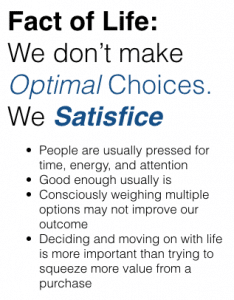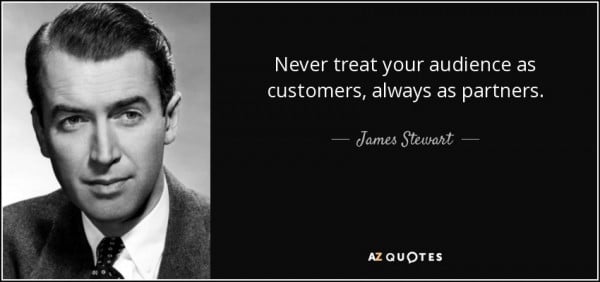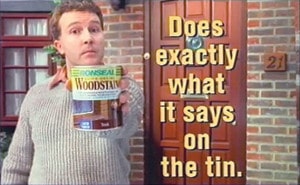First, if all you want are the two slogans, you’ll either have to wait to the end, or scroll to the bottom.
 Second, this is sort of an anti-reason-why advertising screed. So if you love, love, love Unique Selling Propositions, here’s fair warning that this post might piss you off.
Second, this is sort of an anti-reason-why advertising screed. So if you love, love, love Unique Selling Propositions, here’s fair warning that this post might piss you off.
And let me confess: I like reason-why advertising. I really do.
There’s a part of me that believes nothing beats a straightforward offer of benefit that can’t be matched by the competition.
15 minutes could save you 15% on car insurance? Solid!
But…
As ad man and copywriter, I can’t deny two obvious truths:
- It is vanishingly rare for a local business to have an un-contestable reason why
- Even when they DO have one, it’s usually not sufficient to persuade people to buy
The reasons for this are multiple.
- The nature of competition dictates that a key selling feature that really wins sales will very quickly become adopted by the competition. In 1984 Dodge introduced the modern minivan and it sold like hotcakes; in ’85 Chevy released their own minivan, and by 87 everyone had one. And how long did it really take before every airline and every credit card had an air miles program?
- When a local company’s product or service IS superior, it’s usually due to scores or hundreds of smaller improvements, rather than some silver bullet feature that can be easily pitched or demonstrated in an ad
- Just because something is true, that doesn’t mean the public is required to believe it, let alone to act on it.
So it boils down to this: if you want to write advertising that works, you’re going to have to do it even when you don’t have a reason-why appeal.
Even more importantly, you’re going to have to accept that all of the reasons-why you do have can only serve as a support for your main appeal — reasons why can never be the main appeal by themselves.
What should you use instead of reasons why?
Let’s start by looking at:
Satisficing & The Positively Good
 For the vast majority of purchases, customers aren’t driven to get the very best, most optimal product or service at the lowest possible price.
For the vast majority of purchases, customers aren’t driven to get the very best, most optimal product or service at the lowest possible price.
Optimizing a purchase demands more time, energy, and attention than anyone can spare for 99% of purchases.
Instead, people simply want their needs filled and hoped-for benefits granted at a reasonably fair price.
In other words, people practice what economist Herbert Simon calls “satisficing.” A good enough solution that requires little thought or energy is, well, good enough — it’s the one that wins.
This isn’t just kind of important, it’s crucial. So let me spell out the implications:
- Most customers are willing to pay more to be sure; it’s most important for them to be sure they bought the right thing and will get the benefit they are after with only one purchase and attempt at use; saving money or getting an extra few percent of performance from a purchase are significantly less important.
- A good enough solution that comes to mind first and is easy to arrange will get the sale before a better solution that requires research and effort.
- Most customers will pay for convenience and the elimination of risk and hassles; they have more money than time
- As long as your price is “fair,” it is low enough, and what’s fair for the sure thing is significantly more than what’s fair for a bargain of questionable quality.
So the goal is not necessarily to convince prospective customers that your company is the absolutest bestest thing that ever was; the goal is to convince the customer that your product or service is, in the words of David Ogilvy, “positively good.”
Allow me to quote from Ogilvy on Advertising:
“My partner Joel Raphaelson has articulated a feeling which has been growing in my mind for some time:
‘In the past, just about every advertiser has assumed that in order to sell his products, he had to convince consumers that his product is superior to his competitor’s.
This may not be necessary. It may be sufficient to convince consumers that your product is positively good. If the consumer feels certain that your product is good, and is uncertain about your competitor’s, he will buy yours.
If you and your competitors all make excellent products, don’t try to imply that your product is better. Just say what’s good about your product — and do a clearer, more honest, more informative job of saying it.
If this theory is right, sales will swing to the marketer who does the best job of creating confidence that his product is positively good.’
This approach to advertising parity products doesn’t insult the intelligence of consumers. Who can blame you for putting your best foot forward?”
When your advertising focuses on making you the positively good, you reassure prospective customers that they really will get the benefit they’re after — so long as they buy from you.
You help to eliminate the risk of buying the wrong thing or being disappointed with a purchase. And people truly are willing to pay more to eliminate those risks.
Even better, you get the chance to show people how you represent “the honest goods.”
As I’ve said before “Even a vicious criminal wants his gun manufactured by a virtuous man,” which is to say that demonstrating and dramatizing virtue on the part of the product, manufacturer, or service provider is often enough to move the needle.
And this brings us to Bonding & Identity
Bonding & Identity As The Real Reason-Why People Buy
When you claim your product or service represents “the honest goods” and that you are, in turn, a virtuous business, you aren’t just helping to establish your offer as more of a sure-thing, you are also making an appeal to values and identity.

Customers that identify themselves as honest people want to own honest products and do business with honest companies, simple as that.
And if “honest” or “virtuous” seem preachy, you can always substitute “authentic” if you want. Or most any value, for that matter.
Because while needs may dictate much of WHAT we buy, identity determines which TYPES of things (aka which brands) we buy:
- You need new jeans, so you buy a pair. But you’re not paying 4X the price of a pair of Levi’s 501s for fancy-schmancy selvedge denim because of need; you do it because of values and identity — how those jeans make you feel and what they say about you to the world.
- You may need a large family hauler, but you don’t buy an SUV over a minivan, or a Mercedes over a Chevy because of need, you do it because of identity.
- You may need a new smartphone, but chances are the brand you buy will likely have more to do with the way you see yourself than with the particular features and pricing on the phone.
So it makes sense to advertise in a way that helps people understand and identify with your values, rather than trying to hammer home some kind of reason-why Unique Selling Proposition.
As my marketing mentor says: “We buy what we buy to remind ourselves – and tell the world around us – who we are.”
The Marlboro Man doesn’t tell you why Marlboros are so much better than other cigarettes, his ads just quietly imply that he’s the kind of guy who smokes Marlboros, and if you’re also that kind of guy (or want to be that kind of guy), you should smoke them too.
This Entire Article Summed Up In Two Slogans

My two all-time favorite slogans are:
- Ronseal’s “Does exactly what it says on the tin”
- Heckler & Koch’s “In a world of compromise, some don’t”
Think of Ronseal’s slogan as the perfect embodiment of “The Positively Good.” They’re not trying to tell you that their wood stain is the bestest most-awesomest wood stain ever. They’re promising you that their stain will do what you want it to do, no questions asked, so you can be sure of what you’re getting.
 And think of H&K’s slogan as pure Identity. If you’re a no compromise kind of guy, you should be buying H&K’s guns, because they’re a no-compromise kind of company that makes no-compromise firearms.
And think of H&K’s slogan as pure Identity. If you’re a no compromise kind of guy, you should be buying H&K’s guns, because they’re a no-compromise kind of company that makes no-compromise firearms.
In my opinion, the majority of local businesses could simply re-imagine and re-word these slogans and come up with a more powerful branding campaign than whatever BS, over-hyped reason-why advertising they are currently running.
P.S. If you have solid reasons-why, you don’t have to ignore or hide them. Just make sure they work to support your primary claims of Identity and being “Positively Good.” Make them the proof elements for your persuasion, rather than trying to force them to do the entire job all by themselves.
- Are You Paying for Too Much for the Wrong Keywords? - July 15, 2024
- Dominate Your Market Like Rolex — 4 Powerful Branding Lessons - July 3, 2024
- Military-Grade Persuasion for Your Branding - June 25, 2024
